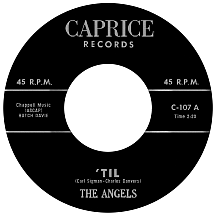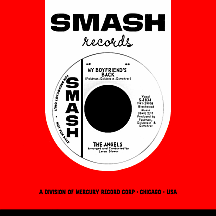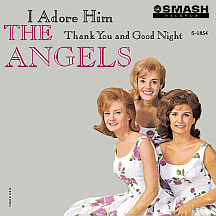THE ANGELS
They weren't exactly angels, as the name might suggest. Nice girls, maybe, but do nice girls warn would-be suitors that they're '...gonna get a beatin'' if they don't get a clue there's another guy who got there ahead of them? Well, yes...some of them do. One such trio of Jersey girls didn't mince lyrics with their signature hit, "My Boyfriend's Back," top of the charts in August and September 1963. Sisters Barbara and Phyllis Allbut of Orange, New Jersey had entered the music business three years earlier, pounding the streets with a determination that got them into New York's recording studios. They met numerous others like themselves and several girl groups resulted. The Angels became the most successful of these interlocking acts.
Barbara (nicknamed "Bibs") and Phyllis ("Jiggs"), who had birthdays on the exact same day in 1940 and 1942, were heard singing into a Voice-O-Graph (one of those public vending machines popular from the '40s to the '60s that would record voices on a vinyl disc for about 50 cents); someone in the biz heard them and before long they were singing on real demo recordings. With Lynda Malzone and Bernadette Carroll, they had two singles on the local Astro label as The Starlets (other groups existed with the same name, one from Chicago with a hit, "Better Tell Him No," and others later in the '60s on Okeh, Tower and Chess). The quartet's first, "P.S. I Love You" (a Gordon Jenkins-Johnny Mercer ballad that had scored in '34 for Ruddy Vallée and in '53 for The Hilltoppers), received airplay on stations in several New York and New Jersey cities in the spring of 1960.
They took some tongue-in-cheek liberties with William Shakespeare's "Romeo and Juliet" (one of the love-struck teens lives!), after which Bernadette moved on to pursue a solo career and Astro was through with them. Lynda also left and Barbara (a budding vocal arranger) was accepted at Juilliard, leaving Phyllis on her own. Then nearby Newark girl Linda Jansen (birth name Jankowski) joined and Gerry Granahan, owner of the fledgling Caprice label, showed interest. Barbara didn't stay long at the prestigious school...the lure of musical stardom was too great. That was when the Angels officially started (there had been previous male Angels groups, one from Philadelphia that recorded a single for Grand in 1954, another - from Newark! - with a one-shot on Gee in 1956 and possibly others). They went right into the studio to do a version of "'Til" (originally "Till," an ultra-romantic song from '56 with French origins, penned by Charles Danvers with English lyrics by Carl Sigman). With staff producer Hutch Davie in charge and Linda's sweet vocal performance, the song became a top 20 hit in December 1961.
They landed back in the top 40 in April '62 with "Cry Baby Cry," a Morris Bailey, Jr. song with a Davie arrangement similar to the previous hit. A spring '62 remake of Doris Day's charmingly self-congratulatory "Everybody Loves a Lover" didn't click (The Shirelles had better luck with the song several months later) and it was pretty much downhill from there with two final 45s including a banjo-backed take on previous Highwaymen hit "Cotton Fields." Linda called it quits (for the time being) and her replacement came with credentials: Belleville, N.J.-born Peggy Santiglia (who at the time went by the name Peggy Farina) had been a member of The Delicates (best known for "Ronnie is My Lover" in 1959, Murray the K of WINS in New York was a strong supporter) and also had a role on Broadway in Jule Styne's 1960 musical Do-Re-Mi. Her vocal delivery became the key to near-future success.
In early 1963, the trio crossed paths with three guys who were ready to take them to the next level. Bob Feldman and Jerry Goldstein had drawn attention to themselves singing on the streets of Brooklyn in the late '50s, then composed the theme for Alan Freed's N.Y.-based TV series The Big Beat. Later, as Bob and Jerry, they recorded "We're the Guys (Who Drive Your Baby Wild)," an early version of Barry Mann's "Who Put the Bomp." After meeting Richard Gottehrer, the three worked together for many years. Feldman got the idea for their breakthough song after witnessing a young girl reading the riot act to a boy who had certain intentions: "You've been telling lies about me that aren't true! My boyfriend's back and he's gonna kick your..." and so on. The Angels recorded a demonstration disc of "My Boyfriend's Back," targeted as the next release for hot foursome the Shirelles...but the demo, with Peggy's assertive lead vocal, was so good it got them a contract with Mercury Records' Smash label.
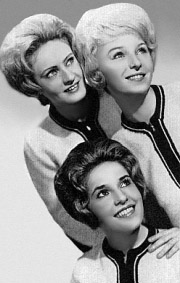
The song entered the Billboard chart the first week in August and was number one by the end of the month. This slightly different Angels group came across a little wilder than the tender "'Til" girls of two years earlier; a confident performance on ABC-TV's Jimmy Dean Show ramped up the energy of the radio version and afterwards prompted a comment from Jimmy: "Just think, someday we'll look back and say: that was one of the good old songs!" Their album even featured a sequel using the same tune, "The Boy With the Black Eye" ('...my boyfriend, now, he knocked him out cold...'). At that point, would it have made sense to reverse the mood on successive releases? Well, the FG&G team thought so and began producing positive-themed songs. "I Adore Him," penned by Jan Berry and Artie Kornfeld, praised romance in an extra-enthusiastic way and they were back in the top 30 in November. Its B side, "Thank You and Goodnight," leaned a little nearer the serene tone of "'Til" and for a time it was heard every night as the closer for Murray the K's show.
"Wow Wow Wee (He's the Boy For Me)," another bright, uptempo track (penned by the producing trio plus Robert Spencer and lead singer Peggy) returned the trio to top 40 territory in early '64. Softer-tempoed follow-up "Little Beatle Boy" somehow got lost among the plethora of seemingly-daily Fab Four novelties. Peggy Santiglia decided to pursue a solo career, quitting the group and getting a single out on Vee-Jay's Tollie subsidiary under the name Peggy Sans; "Give Your Love" was produced by Bob Gaudio of The 4 Seasons. Later she released "Dixie" under the name Tiffany Michel. The Allbut sisters ventured forth with some of their efforts sung in unison; Toni Mason joined just as the Angels' future with Smash was becoming uncertain.
In February 1965, Bibs, Jiggs and Toni did a one-off session with songstress Jean Thomas (a Manhattan studio regular since 1959, she'd recently sung with 4 Seasons-affiliated girl group The Rag Dolls in addition to The Powder Puffs on Imperial and most recently The Calendar Girls on Kapp and had also made records under her own name as Jean, Jeanne and Jeannie Thomas). Feldman, Goldstein and Gottehrer produced a song on ABC-Paramount's Apt label credited to the four as Angie and the Chicklettes, issued within days of the announcement that Ringo Starr had married hairdresser Maureen Cox (putting him out of circulation in the minds and hearts of millions of female fans). "Treat Him Tender, Maureen (Now That Ringo Belongs to You)" became the second Beatles-related novelty with Allbut sisters involvement in less than a year.
While managers and the labels (Congress and Mercury/Smash) debated legal ownership of various members' contracts, the middle-'60s lineup did several sessions for Congress Records as The Halos (an obvious nod to their more famous name taken from an Angels album, A Halo to You). Might the members of the hitmaking male Halos group from the Bronx proceed to file a legal claim? Well, they didn't. Toni departed and Debra Swisher (of the recently-disbanded Pixies Three) filled the vacant lead singer spot. Four Halos singles came at three month intervals between June '64 and early '65, each consistent with the more mature sound being dispensed by other girl groups of the time. Feldman, Goldstein and Gottehrer shammed as a real band, scored a few hits as The Strangeloves in '65 and '66 and indulged in a side project as The Beach-Nuts; the Halos/Angels joined them on "Out in the Sun (Hey-O)," a takeoff on Harry Belafonte's '57 standard "Banana Boat (Day-O)."
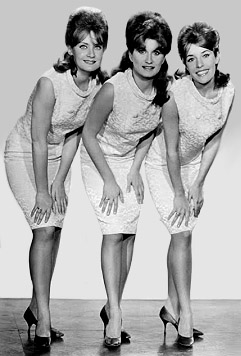
Bibs, Jiggs and Debra, headstrong professionals like all the group's singers, stayed busy with recording sessions backing other artists, TV commercials, jingles and anything music-related. They were reinstated as the Angels in early 1967 and signed a contract with RCA Victor; the FG&G team was out of the picture. The more sophisticated, less-teen-like material was produced by Ted "She Cried" Daryll and Pierre Maheu (who'd previously recorded as Rocky Hart) with arrangements handled by Trade Martin, Lee Holdridge and even Hutch Davie from the Caprice days; "I Had a Dream I Lost You" and the Burt Bacharach-Hal David delicacy "You'll Never Get to Heaven (If You Break My Heart)" garnered scattered airplay but failed to catch on. Debra moved on and Bernadette Carroll (whose "Party Girl" had been a minor solo hit in '64) rejoined in time to do the spotlight vocals on a pair of Neil Diamond songs: "The Boy with the Green Eyes" and "Merry-Go-Round." In 1969 they figured it was time to break up the act, but that would prove impossible for such die-hard young dreamers who'd already logged about a decade apiece in the music business.
In the interim, Peggy had secured one lasting claim to fame: she and Gaudio composed a durable 4 Seasons hit, "Beggin'." In the early '70s she was involved in the reformation of the Angels with Jiggs and Lana Shaw, a singer she'd crossed paths with around 1970 when they were members of folk group The Serendipity Singers. Bibs rejoined soon afterwards, keeping the sister part of the act intact. They were a welcome addition to oldies shows and recorded one last single for Polydor in 1974, "Poppa's Side of the Bed," arranged in a more soulful style than usual by Charles Calello of 4 Seasons fame, who was billing himself at the time as Charlie (for those of you putting the puzzle pieces together, the ABC-TV series Charlie's Angels didn't come along until two years later).
Lana finished her time with The Angels around 1978. Two separate acts used the name on and off for the better part of four additional decades; Jankowski hired singers to tour with her as Linda Jansen's Angels. But audiences were treated to a live experience more reminiscent of the group they remembered with the other lineup: Barbara "Bibs" Allbut, Phyllis "Jiggs" Allbut and the signature vocalist who expertly delivered warnings like 'If I were you I'd take a permanent vacation,' girl group queen Peggy Santiglia.
NOTABLE SINGLES:
- P.S. I Love You - 1960
as the Starlets - Romeo and Juliet - 1960
as the Starlets - 'Til /
A Moment Ago - 1961 - Cry Baby Cry - 1962
- Everybody Loves a Lover - 1962
- My Boyfriend's Back - 1963
- Cotton Fields - 1963
- I Adore Him /
Thank You and Goodnight - 1963 - Wow Wow Wee (He's the Boy For Me) - 1964
- Little Beatle Boy - 1964
- Dream Boy - 1964
- Treat Him Tender, Maureen (Now That Ringo Belongs to You) - 1965
as Angie and the Chicklettes - Just Keep on Loving Me! - 1965
as the Halos - Since I Fell For You - 1965
as the Halos - Baby What You Want Me to Do - 1965
as the Halos - Come Softly to Me - 1966
as the Halos - I Had a Dream I Lost You - 1967
- You'll Never Get to Heaven (If You Break My Heart) - 1967
- The Modley: Moments to Remember, Theme from a Summer Place,
One Summer Night - 1968 - The Boy With Green Eyes - 1968
- Merry-Go-Round - 1968
- Poppa's Side of the Bed - 1974


